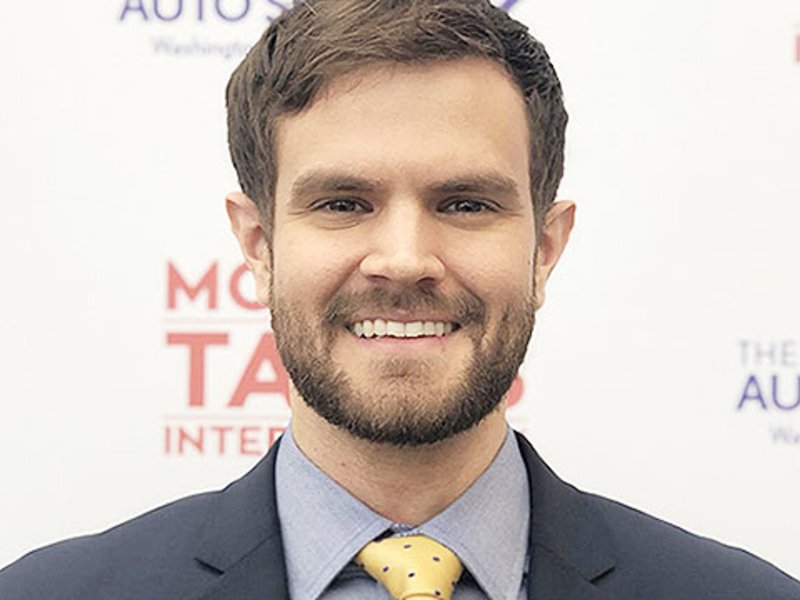
Kevin Schlosser has made it his mission to make driving safer by advocating for autonomous vehicles.
Schlosser’s first experience with the dangers of the roadways came when his mother was involved in a car crash when he was 12 years old. Schlosser’s mother survived the accident, though another person involved was killed. Then, in 2017, Schlosser lost his girlfriend in a vehicle crash.
“I needed to do something,” Schlosser, now 30, told Automotive News. “I needed to help find a safer means of transportation.”
In a lecture Schlosser attended a few months later, Richard Bishop — longtime automotive consultant and former program manager for vehicle-highway automation at the Federal Highway Administration — spoke on autonomous vehicles. It was Schlosser’s introduction to the possibilities of new modes of transportation.
The two connected a few months later and began working together on researching autonomous vehicles.
Inspired, Schlosser formed the DC Autonomous Vehicles Association in fall 2018, a group that advocates for safer vehicles and seeks to educate the community on AVs.
The group was organized through online service Meetup and engaged locals who shared a general interest in technology and mobility.
The group, now with more than 200 members, holds events, participates in local outreach with government officials, public organizations and businesses, and partners with key industry leaders.
For example, the DC-AVA held an event in December that drew notable panelists from Securing America’s Future Energy, VW Credit Inc., the U.S. Senate Committee on Commerce, Science and Transportation, and the Alliance For Automotive Innovation to discuss how autonomous vehicle policy can drive the future of mobility.
The group has also attracted attention from auto companies and other organizations focusing on AV policymaking. Schlosser said DC-AVA also partners with Connected CarTalk D.C. for monthly happy hours.
Other interest groups have sprung up in recent years, but the DC-AVA appears to be rare in that enthusiasts, not experts, started the organization.
A similar group based in Philadelphia, the Philly Autonomous Vehicle Enthusiasts, is open to anyone interested in mobility technologies, including connected, autonomous, electric and shared vehicles and how they relate to the future of transportation.
But grassroots AV advocacy groups generally start with experts in the field.
Back in D.C., the Autonomous Vehicles Working Group draws together a number of city leaders and administrators for peer-to-peer discussions on the implications of autonomous vehicles. Other coalitions rely on industry partners to channel their discussions.
Schlosser himself pivoted from a career as a corporate accountant — with almost no automotive experience — to now splitting his time between part-time autonomous vehicle consulting for Bishop’s Maryland-based Bishop Consulting company and spearheading this grassroots organization. Schlosser channels his energy toward AVs, micromobility, public transit, more equitable access to transportation and the ways these different modes of transportation can be transformative.
“There’s a lot of misconceptions out there about what AVs can do and what they can’t,” Schlosser said. “Because of our efforts, DC-AVA is going to be a thought leader and collaborator on the true future of mobility here in the region.”
Members often point to crash statistics as reasons for their advocacy. According to the World Health Organization, road-traffic injury is the leading cause of death for people ages 5 to 29. NHTSA reported that there were 36,560 people killed in motor vehicle traffic crashes on U.S. roadways during 2018.
“Our priority has always been making roads safer. I think that really has been the driving force behind it. But we realized that to achieve that goal and make actual progress towards that goal, we do need to bring the community together to understand things like the business implications of autonomous vehicles,” Schlosser said.
“There’s a lot of talk about potential job loss due to autonomous vehicles, but there’s also a lot of business opportunity that they can bring about as well. They can also certainly bring together things like a more equitable access to transportation,” he added.
Though the D.C. region remains relatively progressive on AV technology, Schlosser still encounters skepticism.
A crash involving an Uber Advanced Technologies Group vehicle in Tempe, Ariz., in 2018 killed pedestrian Elaine Herzberg. The vehicle’s safety driver was reported to have been watching “The Voice” TV program on her phone at the time of the crash. This, along with incidents involving Tesla’s Autopilot, have made consumers wary, and automakers are taking a step back on their overly-ambitious deadlines for fully autonomous passenger vehicles.
“My heart is broken for Elaine Herzberg and her family. I know what they’re going through all too well, but I think it’s something that players in the field have learned from, and that’s something that’s further ingrained the need for safety into the culture of autonomous vehicles. It’s important that we don’t lose sight of our end goals here,” Schlosser said. “In my mind, there is no other option.”